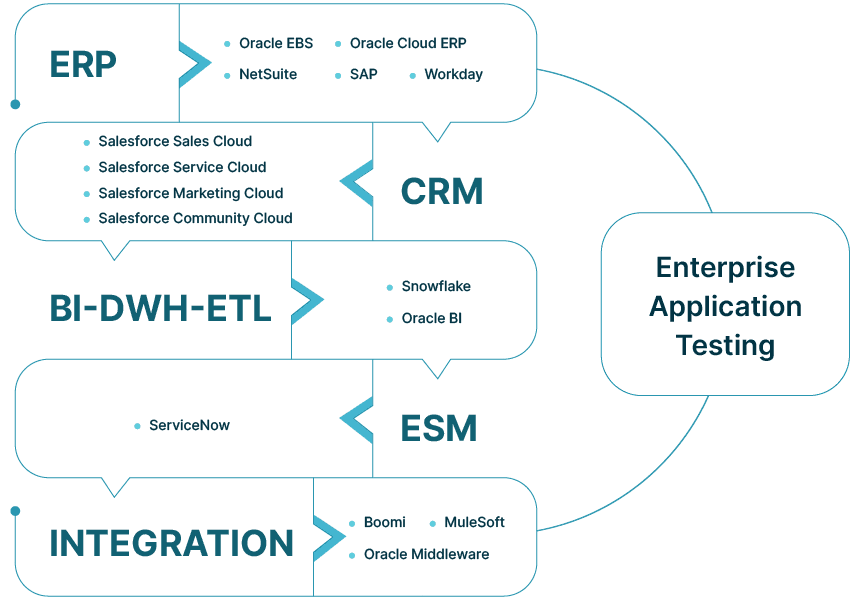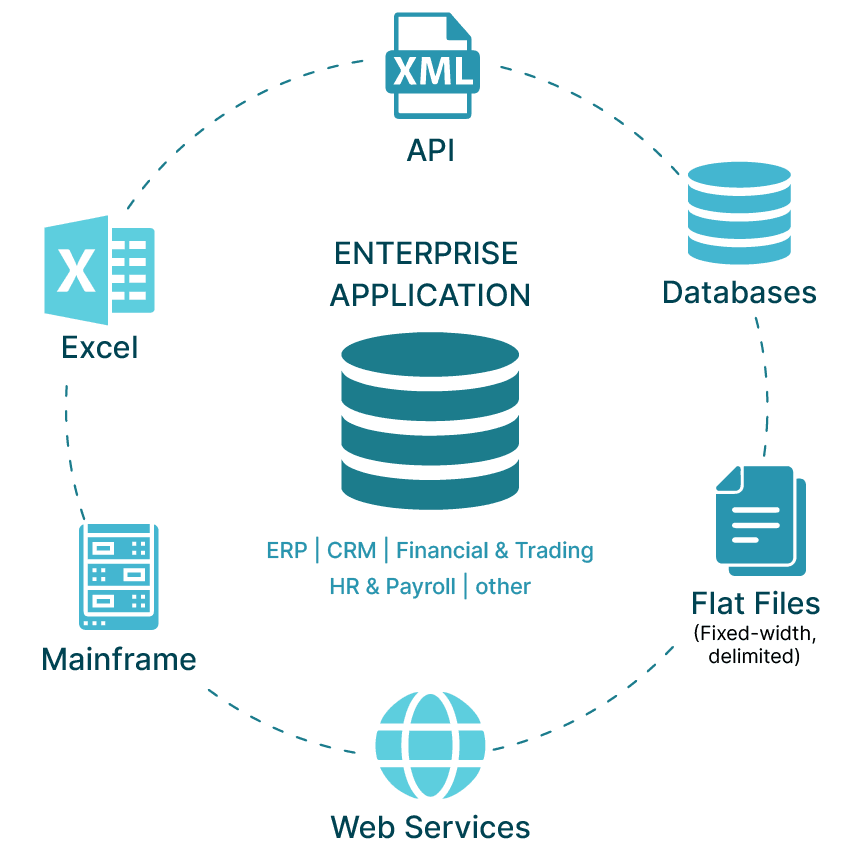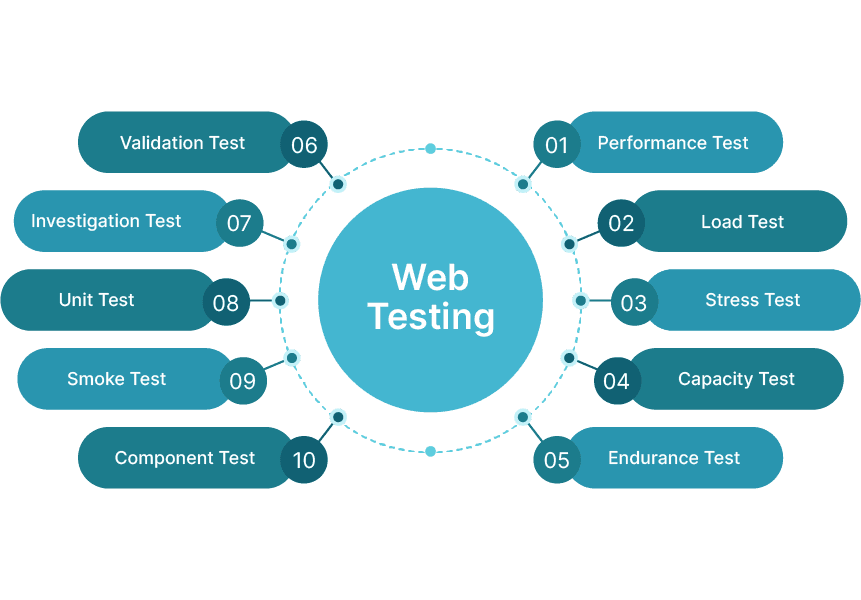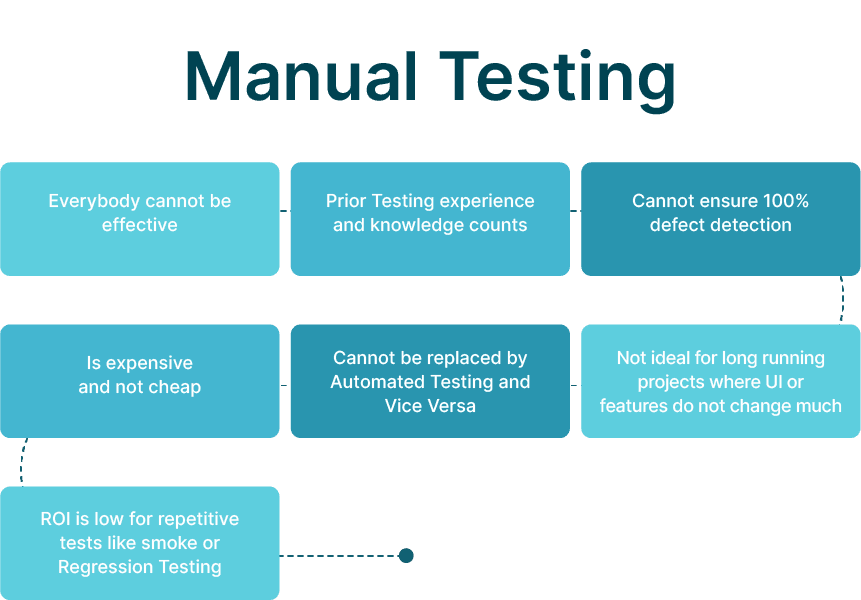Enterprise applications serve as the digital backbone that supports and empowers virtually every aspect of modern operations. They help improve efficiency, increase productivity, and enhance customer experience.
Since enterprise apps are lifeblood of any organization, they need to undergo comprehensive testing to ensure business continuity. Are you a director of enterprise applications, or working in that capacity to keep an ERP environment safe? In this blog, we’ll highlight the challenges in enterprise software testing and outline why test automation is the only way for organizations to execute reliable and extensive Enterprise Application testing.

Enterprise applications are designed to boost productivity, minimize human intervention, and optimize operational efficiency through automation. Examples of their functions include:
- Customer Relationship Management (CRM)
- Supply Chain Management (SCM)
- Enterprise Resource Planning (ERP)
- Payroll Management Systems (PMS)
- Human Resource Management Systems (HRMS)
- Portfolio Management Systems

What Is Enterprise Software Testing?
Enterprise software testing is any software testing process that ensures that critical workflows run smoothly. This includes functional testing, performance testing, and security testing. Software testing also seeks to streamline processes across the human resource, financials, inventory, customer relationships, and more.
The aim of enterprise software testing is to ensure that these applications meet the specified requirements, work as intended, and are reliable in a real-world business environment.

Enterprise Application Testing Types
- Functional testing: In this testing type, individual functions and features of an application are validated to ensure that they work correctly and meet the business requirements. Test cases in functional testing are designed to verify that the application behaves as expected and supports critical business processes.
- Integration testing: Organizations use multiple apps to manage business processes. For instance Oracle Cloud for financial management, Salesforce for customer relationships, and Workday for human resource management. Integration testing is critical as it ensures that data and processes flow smoothly between integrated systems – components, modules, or different enterprise applications.
- Security testing: Since corporate data is sensitive, it needs to be protected from external and internal threats. This is where security testing comes in. It is critical as it identifies vulnerabilities and weaknesses in the application’s security mechanisms. It helps protect sensitive data and ensure compliance with industry regulations.
- Compatibility testing: This verifies whether or not the application works correctly on different platforms (such as various operating systems and web browsers) and with different devices.
- Performance Testing: This type of testing evaluates how well the application performs under various load conditions. Learn more about Opkey’s load testing capabilities.
- User acceptance testing (UAT): UAT involves end-users testing the application to confirm that it meets their needs and expectations before deployment.
- Business process testing: This type of testing focuses on validating that the enterprise application supports critical business processes, such as order processing, inventory management, and financial transactions.
- API testing: API testing validates the functionality, reliability, security, and performance of APIs. API testing ensures that data and interactions among different software components work as expected and adhere to the specified requirements.
- Smoke testing: Also known as “build verification testing, smoke testing determine whether a new software build or release is stable enough for more comprehensive testing.

Core Challenges in Enterprise Application Testing
According to Gitlab, organizations across the globe have embraced Agile and DevOps to deliver quality software solutions at speed. However, the majority of organizations still rely on manual testing which is the biggest bottleneck in realizing Agile and DevOps.
Teams expect continuous, near-instant feedback
- Agile and DevOps are often about delivering new software updates on a weekly or even daily basis. QA teams simply cannot keep up with the speed of development. Also, development teams anticipate receiving ongoing feedback throughout the release cycle.
- Speedy feedback regarding the effects of recent modifications on critical end-to-end transactions is vital, as accelerated delivery introduces the potential of jeopardizing the user experience in each release. This level of feedback can only be achieved with test automation.
There’s less time available to test
- In this era of Agile & DevOps, enterprise application vendors like Oracle, SAP, Dynamics 365, Salesforce, Workday, and Coupa are rolling out updates more frequently. Every time an update is released, regression testing needs to be performed to ensure business continuity.
- However, this isn’t possible with manual testing, even if you hire an entire army of manual testers. Thus, you need to bring in high degree of test automation to keep pace with today’s cadences.
Learn more: Manual vs. Automated Testing
Business expectations are dramatically different
- To keep pace with ever-changing business requirements, app owners are now expected to deliver more innovative applications faster than ever. Since manual testing is carried out as an end of development activity, it leads to much rework, redesign and rethinking of strategy.
- If critical bugs are discovered after all development is completed, this impacts the time to market adversely. The ideal approach is to bake testing in the development process. Thus, you need to bring in continuous testing to keep your projects within timelines (and budget).
How to minimize system downtimes
- As an enterprise architecture, you must be fully aware how much system downtime can cost you. According to reports, system downtime hourly costs for large companies can exceed $1 million per hour. End-to-end coverage, empowered by automation, can majorly minimize risk.
- Real-world example: 2021 outage cost Meta nearly $100 million in revenue. Not only were Meta’s flagship services (Facebook, WhatsApp, Instagram) down, but so too were their internal systems—employees couldn’t even get into offices using their keycards.
What to keep in mind when embarking on automation
Finding the right test automation tool
- Due to availability of wide range of automated testing tools, finding the right tool is a challenging task. In the enterprise world, both technical and non technical folks participate in testing. Thus, you need to choose the test automation tool smartly so that everybody can easily participate in testing.
Deciding what to automate
Deciding which tests for enterprise applications need to be automated is key to a healthy program. Some of the tests processes you should consider automating include:
- Business critical test cases: Consider to automate regression testing, integration, security and smoke testing. This ensures that your enterprise application will operate seamless even after updates or workflow change.
- Repetitive tests: An enterprise application often needs to be tested across different browser/ OS combinations. Doing this manually can be very time-consuming. Thus, opt for automation tools that support parallel testing.
Addressing Test Automation Challenges With Opkey
- Opkey is an industry leading quality assurance framework that helps you automate testing for your enterprise application.
- Opkey’s robust test strategy accelerates your testing cycles and minimizes testing efforts so that you can make testing central to the development cycle.
- Modern testing approach aligned perfectly with Opkey as it seamlessly integrates into your CI/ CD pipeline, enabling test strategy implementation in development phase.
Here’s how we do it.
- No-Code automation: Opkey is the industry’s leading No-Code test automation tool. This means that it can be operated without programming knowledge. Business users who are non-technical can be incorporated in testing. Since they are the ones who knows critical business workflows, their incorporation ensures full test coverage.
- Automatic business process documentation: Opkey mines your configurations and offers automatic business process documentation. You don’t need to do it manually. This saves major time and accelerates the testing process.
- Single click automation: Opkey makes testing effortless as it automates all your existing manual test cases with a click of a button.
- End-to-end test coverage: Opkey supports 12+ enterprise applications and 150+ technologies – mainframe, API, Web, Citrix, and Mobile to deliver end-to-end risk coverage.
- Self-healing capabilities: Opkey’s built-in AI-empowered technology automatically identifies the impacted test scripts and heals them automatically to make test maintenance effortless.
- Pre-built accelerators: With Opkey, you don’t have to start from scratch. Opkey offers 30,000+ prebuilt test accelerators across 14+ ERPs.
- Test data management: Opkey provides you the right set of test data so that your QA team can easily perform testing.
Test Automation with Opkey
Want to learn how Opkey can help you in automating ERP testing? Book a demo




